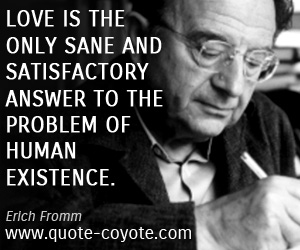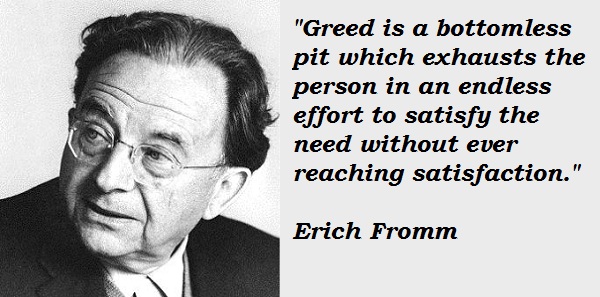Eric Fromm On Human Nature, The Common Laziness Of Optimism/Pessimism And Why We Need Rational Faith In The Human Spirit
“Hope is a gift you don’t have to surrender, a power you don’t have to throw away,” Rebecca Solnit wrote in her magnificent manifesto for hope in times of despair. “And though hope can be an act of defiance, defiance isn’t enough reason to hope.”
Decades earlier, the great German humanistic philosopher and psychologist Erich Fromm (March 23, 1900–March 18, 1980) — a man of abiding wisdom on the art of loving and the art of living — examined the cowardice of despairing pessimism and the much needed courage of rational optimism in his 1972 treatise The Anatomy of Human Destructiveness (public library).

Erich Fromm
In considering how we ought to view human nature, Fromm distinguishes between rational faith in the human spirit, which is “based on the clear awareness of all relevant data,” and irrational faith, “an illusion based on our desires.” He writes:
Optimism is an alienated form of faith, pessimism an alienated form of despair. If one truly responds to man and his future, i.e., concernedly and “responsibly,” one can respond only by faith or by despair. Rational faith as well as rational despair are based on the most thorough, critical knowledge of all the factors that are relevant for the survival of man. The basis of rational faith in man is the presence of a real possibility for his salvation: the basis for rational despair would be the knowledge that no such possibility can be seen.
Millennia after Plato’s insight into negotiating our parallel capacities for good and evil, Fromm adds:
The statement, “Human nature is evil,” is not a bit more realistic than the statement, “Human nature is good.” But the first statement is much easier to make: anyone who wants to prove man’s evilness finds followers most readily, for he offers everybody an alibi for his own sins — and seemingly risks nothing. Yet the spreading of irrational despair is in itself destructive, as all untruth is; it discourages and confuses. Preaching irrational faith or announcing false Messiahs is hardly less destructive — it seduces and then paralyzes.
This, indeed, is why cynicism is so seductive in our present culture — a particularly pernicious form of defeatist resignation masquerading as empowered critical thinking. Fromm captures this brilliantly:
The attitude of the majority is neither that of faith nor that of despair, but, unfortunately, that of complete indifference to the future of man. With those who are not entirely indifferent, the attitude is that of “optimism” or of “pessimism.” The optimists are the believers in the dogma of the continuous march of “progress.” They are accustomed to identifying human achievement with technical achievement, human freedom with freedom fromdirect coercion and the consumer’s freedom tochoose between many allegedly different commodities. The dignity, cooperativeness, kindness of the primitive do not impress them; technical achievement, wealth, toughness do…
The optimists live well enough, at least for the moment, and they can afford to be “optimists.” Or at least that is what they think because they are so alienated that even the threat to the future of their grandchildren does not genuinely affect them. The “pessimists” are really not very different from the optimists. They live just as comfortably and are just as little engaged. The fate of humanity is as little their concern as it is the optimists’. They do not feel despair; if they did, they would not, and could not, live as contentedly as they do. And while their pessimism functions largely to protect the pessimists from any inner demand to do something, by projecting the idea that nothing can be done, the optimists defend them selves against the same inner demand by persuading them selves that everything is moving in the right direction anyway, so nothing needs to be done.
What we need in order to transcend this dual hapless helplessness, Fromm argues, is “rational faith in man’s capacity to extricate himself from what seems the fatal web of circumstances that he has created” — something at the center of his philosophy of humanist radicalism:
Humanist radicalism … seeks to liberate man from the chains of illusions; it postulates that fundamental changes are necessary, not only in our economic and political structure but also in our values, in our concept of man’s aims, and in our personal conduct.
To have faith means to dare, to think the unthinkable, yet to act within the limits of the realistically possible; it is the paradoxical hope to expect the Messiah every day, yet not to lose heart when he has not come at the appointed hour. This hope is not passive and it is not patient; on the contrary, it is impatient and active, looking for every possibility of action within the realm of real possibilities.
In a sentiment evocative of Albert Camus’s timeless wisdom on happiness, despair, and the love of life, Fromm adds:
The situation of mankind today is too serious to permit us to listen to the demagogues — least of all demagogues who are attracted to destruction — or even to the leaders who use only their brains and whose hearts have hardened. Critical and radical thought will only bear fruit when it is blended with the most precious quality man is endowed with — the love of life.
Complement The Anatomy of Human Destructiveness, a rousing read in its entirety, with some thoughts on hope, cynicism, and the stories we tell ourselves and a beautiful reflection on how to anchor our humanity in turbulent times, then revisit Fromm on having vs. being and what is keeping us from mastering the art of loving.



No comments:
Post a Comment